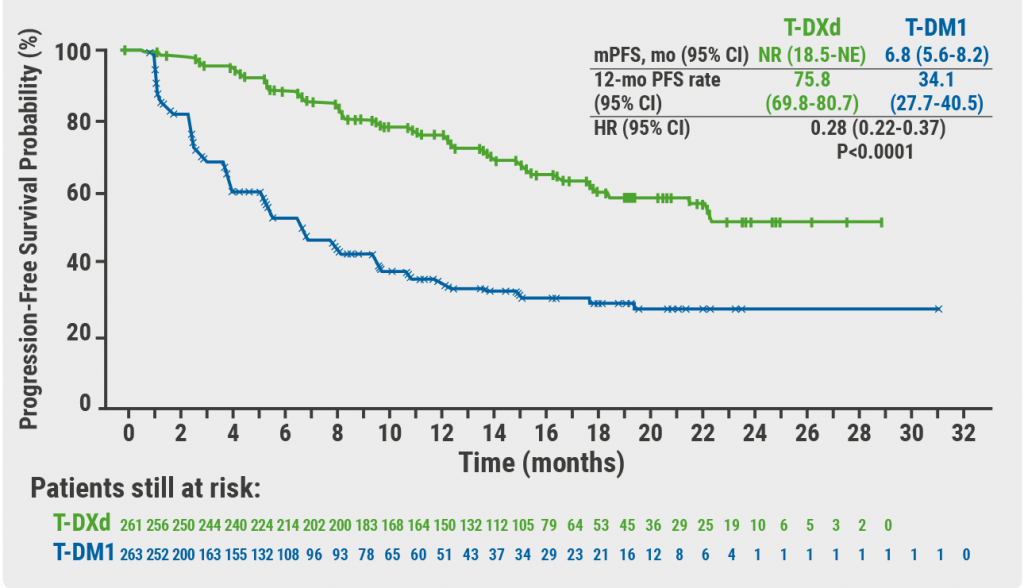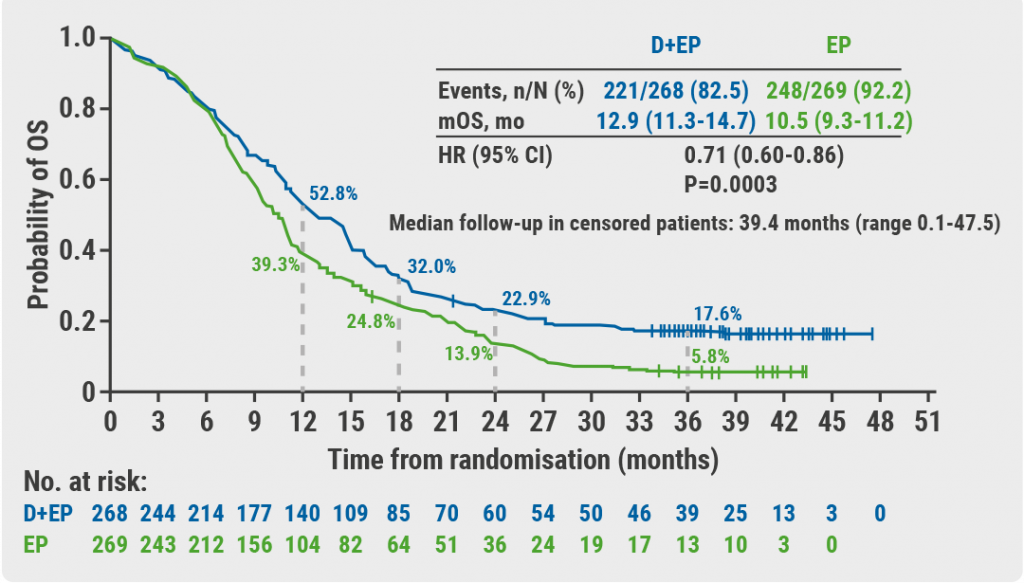Clinical studies have highlighted the efficacy of anti-PD-(L)1 treatment in patients with hypermutated microsatellite instability-high (MSI-H) or dMMR tumours. However, the responsiveness of MSI-H/dMMR tumours to anti-PD-(L)1 treatment is variable. To get more insight in the cause of this variability of response, investigators generated two mouse tumour cell lines inactivated for MSH2 (4T1MSH2-/- and CT26MSH2-/-) to recapitulate the MSI-H/dMMR phenotype. Dr Laetitia Nebot-Bral (Institute Gustave Roussy, France) presented the first results [1].
While anti-PD-1 treatment was effective in the CT26 model, no efficacy was observed in the 4T1 model, even in ultra-mutated 4T1 tumours (>280 mutations/Mb). Unlike the CT26 model, the 4T1 model is characterised by an accumulation of neutrophils. In addition, neutrophil depletion with the antibody αLy6G restored the response of 4T1 tumours to anti-PD-1. The combination of anti-PD-1 and anti-CTLA-4 was also able to restore the response to immunotherapy in the 4T1 model.
“Given that the combination treatment was accompanied by a decrease in neutrophils, it is likely that CTLA-4 blockade may hamper the accumulation of neutrophils,” suggested Dr Nebot-Bral.
Based on these results, Dr Nebot-Bral concluded that “accumulation of neutrophils is associated with resistance to anti-PD-(L)1 monotherapy in MSI-H/dMMR tumours. We propose that anti-PD-1 plus anti-CTLA-4 combination therapy may represent an effective strategy in patients with abnormal neutrophil accumulation.”
- Nebot-Bral L, et al. Neutrophils are associated with resistance to anti-PD-1 monotherapy in mismatch repair-deficient tumors. Abstract 1801MO, ESMO Congress 2021, 16–21 September.
Copyright ©2021 Medicom Medical Publishers
Posted on
Previous Article
« Tetraspecific ANKETs harnesses innate immunity in cancer therapies Next Article
High COVID-19 mortality in Swiss cancer patients »
« Tetraspecific ANKETs harnesses innate immunity in cancer therapies Next Article
High COVID-19 mortality in Swiss cancer patients »
Table of Contents: ESMO 2021
Featured articles
Breast Cancer
Trastuzumab deruxtecan triples PFS
Novel conjugate meets primary endpoint
Longest survival benefit from first-line CDK4/6 inhibitor
Meta-analysis shows 6-months adjuvant trastuzumab is optimal
Double-positive results for triple-negative metastatic breast cancer
Survival after neoadjuvant therapy with trastuzumab-lapatinib plus chemotherapy
Postmenopausal breast cancer: extended letrozole reduces recurrence
Asian women also benefit from palbociclib plus letrozole
No PEARLs of survival with palbociclib plus endocrine therapy compared with capecitabine, but QoL better
Gastrointestinal Cancer
Neoadjuvant chemotherapy potential alternative to neoadjuvant chemoradiotherapy in LARC
Immune chemo-sensitisation looks promising in microsatellite-stable mCRC
Adagrasib shows promising clinical activity in heavily pretreated KRAS-mutated CRC
Automated detection of microsatellite status on unstained samples in early colon cancer
Consistent benefit of anti-PD-1 therapy for oesophageal and gastric cancer
HIPEC in gastric cancer with peritoneal metastases
ctDNA highly predictive in HER2-positive, advanced gastric or gastro-oesophageal junction cancer
Lung Cancer
Robust anticancer activity of trastuzumab deruxtecan in HER2-mutated NSCLC
Nivolumab/ipilimumab continues to provide survival benefit in unresectable MPM
Adjuvant atezolizumab lowers relapse rate in resected NSCLC
Three-year OS follow-up from CASPIAN trial
TCR clonality predicts pembrolizumab response in NSCLC
Melanoma
Adjuvant immunotherapy reduces risk of disease recurrence in stage II melanoma
IFN-γ signature predicts response to immunotherapy
Updated results of SECOMBIT trial
Combining T-VEC and pembrolizumab does not significantly improve survival in advanced, unresectable melanoma
Durable intracranial responses with nivolumab/ipilimumab
Genitourinary Cancer
TKI drug-free interval strategy not detrimental to conventional continuation strategy in RCC
Modified ipilimumab schedule reduces risk of grade 3/4 adverse events
Optimal neoadjuvant dose ipilimumab/nivolumab in stage III urothelial cancer
Better survival with neoadjuvant dose-dense MVAC regimen in MIBC
PARP inhibitor rechallenge improves PFS in ovarian cancer
Pembrolizumab prolongs survival in persistent, recurrent, or metastatic cervical cancer
Pembrolizumab has durable effect in previously treated MSI-H/dMMR advanced endometrial cancer
HRR mutational status is prognostic and predictive biomarker olaparib activity
Haematological Cancer
Mutational analyses are predictive in malignant lymphomas
Low numbers of M2 macrophages in tumour microenvironment associated with superior response to immunotherapy in Hodgkin lymphoma
COVID-19
Adequate response to SARS-CoV-2 vaccine in cancer patients
Cancer patients more likely to die from COVID-19 when hospital admittance is required
Third global survey of the ESMO Resilience Task Force
High COVID-19 mortality in Swiss cancer patients
Basic Science & Translational Research
Neutrophils negatively correlate with response to anti-PD-1 monotherapy in dMMR tumours
Tetraspecific ANKETs harnesses innate immunity in cancer therapies
Early ctDNA reduction in metastatic uveal melanoma correlates better with OS than RECIST response
Gut microbiota as a potential predictive biomarker
Related Articles

November 19, 2021
Trastuzumab deruxtecan triples PFS

November 19, 2021
Three-year OS follow-up from CASPIAN trial
© 2024 Medicom Medical Publishers. All rights reserved. Terms and Conditions | Privacy Policy
HEAD OFFICE
Laarderhoogtweg 25
1101 EB Amsterdam
The Netherlands
T: +31 85 4012 560
E: publishers@medicom-publishers.com

